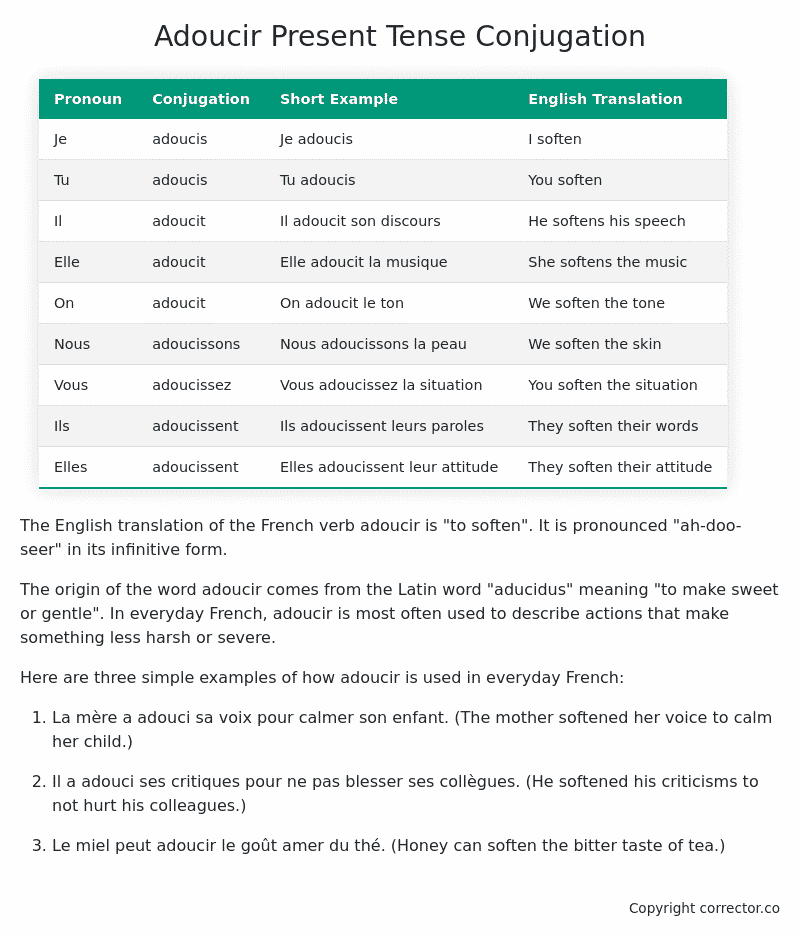Le Present (Present Tense) Conjugation of the French Verb adoucir
Introduction to the verb adoucir
The English translation of the French verb adoucir is “to soften”. It is pronounced “ah-doo-seer” in its infinitive form.
The origin of the word adoucir comes from the Latin word “aducidus” meaning “to make sweet or gentle”. In everyday French, adoucir is most often used to describe actions that make something less harsh or severe.
Here are three simple examples of how adoucir is used in everyday French:
-
La mère a adouci sa voix pour calmer son enfant. (The mother softened her voice to calm her child.)
-
Il a adouci ses critiques pour ne pas blesser ses collègues. (He softened his criticisms to not hurt his colleagues.)
-
Le miel peut adoucir le goût amer du thé. (Honey can soften the bitter taste of tea.)
Adoucir – About the French Present Tense
To take a deep dive into all the French tenses then see our article on Mastering French Tense Conjugation.
Common Everyday Usage Patterns For Le Present
Interactions with Other Tenses
Table of the Present Tense Conjugation of adoucir
| Pronoun | Conjugation | Short Example | English Translation |
|---|---|---|---|
| Je | adoucis | Je adoucis | I soften |
| Tu | adoucis | Tu adoucis | You soften |
| Il | adoucit | Il adoucit son discours | He softens his speech |
| Elle | adoucit | Elle adoucit la musique | She softens the music |
| On | adoucit | On adoucit le ton | We soften the tone |
| Nous | adoucissons | Nous adoucissons la peau | We soften the skin |
| Vous | adoucissez | Vous adoucissez la situation | You soften the situation |
| Ils | adoucissent | Ils adoucissent leurs paroles | They soften their words |
| Elles | adoucissent | Elles adoucissent leur attitude | They soften their attitude |
Other Conjugations for Adoucir.
Le Present (Present Tense) Conjugation of the French Verb adoucir (this article)
Imparfait (Imperfect) Tense Conjugation of the French Verb adoucir
Passé Simple (Simple Past) Tense Conjugation of the French Verb adoucir
Passé Composé (Present Perfect) Tense Conjugation of the French Verb adoucir
Futur Simple (Simple Future) Tense Conjugation of the French Verb adoucir
Futur Proche (Near Future) Tense Conjugation of the French Verb adoucir
Plus-que-parfait (Pluperfect) Tense Conjugation of the French Verb adoucir
Passé Antérieur (Past Anterior) Tense Conjugation of the French Verb adoucir
Futur Antérieur (Future Anterior) Tense Conjugation of the French Verb adoucir
Subjonctif Présent (Subjunctive Present) Tense Conjugation of the French Verb adoucir
Subjonctif Passé (Subjunctive Past) Tense Conjugation of the French Verb adoucir
Subjonctif Imparfait (Subjunctive Imperfect) Tense Conjugation of the French Verb adoucir
Subjonctif Plus-que-parfait (Subjunctive Pluperfect) Tense Conjugation of the French Verb adoucir
Conditionnel Présent (Conditional Present) Tense Conjugation of the French Verb adoucir
Conditionnel Passé (Conditional Past) Tense Conjugation of the French Verb adoucir
L’impératif Présent (Imperative Present) Tense Conjugation of the French Verb adoucir
L’infinitif Présent (Infinitive Present) Tense Conjugation of the French Verb adoucir
Struggling with French verbs or the language in general? Why not use our free French Grammar Checker – no registration required!
Get a FREE Download Study Sheet of this Conjugation 🔥
Simply right click the image below, click “save image” and get your free reference for the adoucir Present Tense tense conjugation!

I hope you enjoyed this article on the verb adoucir. Still in a learning mood? Check out another TOTALLY random French verb present conjugation!


